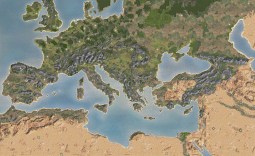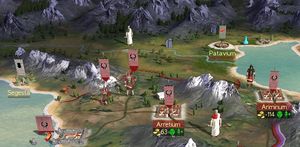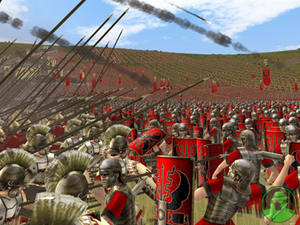Rome: Total War
| Total War Series |
|---|
|
Total War: Three Kingdoms - Portal Total War Saga: Thrones of Britannia Medieval II: Total War - Portal |
Rome: Total War (sometimes abbreviated as RTW) is a strategy game in the Total War Series which combines a turn-based campaign map with real time battles. The game was developed by the Creative Assembly and was released on September 22, 2004.
In 2021, the original Rome: Total War was withdrawn from sale on Steam. It is now bundled with Total War: Rome - Remastered, developed by Feral Interactive and launched on 29 April 2021. The Remaster changed the user interface, heavily updated the campaign map, fixed various bugs, added new modding resources and backported a few of Medieval 2's features, including Merchants. See the dedicated page for a more complete overview.
Contents
Gameplay
Campaign Play
The Imperial Campaign starts in 270 BC and ends in 14 AD. Each year consists of two turns. The player controls one of the playable factions on the campaign map with the goal of conquering new regions in order to achieve victory. They can build various structures, expand their cities and move around characters. When the armies of two factions meet each other, they will engage in battle. The player can choose between auto-resolving the battle and fighting it themselves on the 3D battle map.
The Campaign Map
Rome: Total War's Imperial Campaign map includes Europe, the Mediterranean Sea, parts of North Africa and the Middle East. The campaign map offers many different features. Along with various locations such as settlements and ports there are also several different campaign map characters. Amongst those are generals, captains, diplomats, spies and assassins. The settlements and characters are controlled by the different factions which fight against each other in order to achieve supremacy. Each faction can only see areas which its characters have scouted and regions which are out of sight are covered by the Fog of War, though new information may be negotiated from other factions through diplomacy. Movement around the campaign map is different from earlier games, giving characters more detailed movement than the previous "Risk-style" system.
Factions
- -See the category Rome: Total War Factions for individual pages
In Rome: Total War there are 21 factions, 20 of which can be made playable, and the slave/rebel faction. The three 'Roman Houses' (Julii, Brutii and Scipii) are playable from the beginning of the game. The three playable Roman factions are allied to each other and the Senate.The Senate issues missions to each of the Roman factions, successful completion of Senate missions improves your family's standing with the Senate, while military successes and expansion increase your prestige in the eyes of the masses. A high popularity level is necessary to be able to initiate a civil war against one of the other Roman factions.
The rest of the playable factions can be unlocked either by finishing the short or long campaign with any of the originally playable factions or by editing descr_strat.txt in your Rome: Total War directory (more information on which can be found on this page). It is also possible to unlock the factions that aren't considered 'playable' by the game through the manipulation of the same text file. It should also be noted that destroying any 'playable' faction in the Imperial Campaign that currently isn't unlocked will result in it being unlocked.
The factions are divided by the game files into cultures as follows:
- Barbaric Factions: Germania , Britannia, Dacia, Gaul, Spain, Scythia
- Roman Factions: The House of Julii, The House of Brutii, The House of Scipii, The Roman Senate
- Egyptian Factions: Egypt
- Eastern Factions: Parthia, Armenia, Pontus
- Carthaginian Factions: Carthage, Numidia
- Greek Factions: Greek Cities, Macedon, Seleucid Empire, Thrace
Multiplayer Terminology
In RTW Multiplayer Communities, the term Skirmish Faction refers to a Faction that is weak in pitched battles but is strong on hit-and-run attacks. Brittania, Dacia, Egypt, Gaul, Germania, Parthia, and Scythia fit the definition of Skirmish Faction as their Unit Rosters contain fast units such as cavalry and chariots but no heavy infantry. As a result, they are weak and can be difficult to use in competitive gameplay against stronger factions with heavy infantry such as Rome, The Greek Cities, and Macedon.
Units
- -See main article:Rome: Total War Units
Battle Play
Battles in Rome: Total War can be epic events containing thousands of individual soldiers.
- -See Battle Map Play - RTW for elements specific to Rome: Total War.
Historic Accuracy
Various criticisms have been levelled at the game in regards to historical inaccuracies. The splitting of Roman territory into that of the Senate and then those of three families is somewhat ahistorical, as is the simplification of Roman politics, a mechanism which has been removed from many mods of the game in order to introduce a greater variety of factions. The treatment of the Greek Cities as one unified body, governed from Sparta, as well as the arming of hoplite units with long pikes, makes the Greeks a rather inaccurately represented faction. Other inaccuracies include the large and unified territories of many barbarian tribes, much like the Greeks, and the fielding of Bronze Age Egyptian troops rather than those of the Ptolemaic era.
Main Differences to Earlier Total War Games
A major difference between Rome and earlier games in the Total War Series is the way the in campaign battle maps are generated. From Rome onwards, the battle map is generated to match the area of terrain where the armies are actually located, including the adjacent mountains, rivers, forests and settlements. This allows a greater level of strategy in planning battles to suit the armies involved, as well as plan ambushes in forested terrain.
Movement around the campaign map is different from earlier games. Instead of moving 'Risk' style from one region to another, armies and characters on the map have a certain amount of "movement points" which determine how far they can travel per turn, depending on the type of troops and any effects of the commander. Terrain also varies the possible extent of movement, with forests and hills slowing travel while roads increase speed when they are developed.
Expansions
- Barbarian Invasion, released on September 27, 2005.
- Alexander, released on June 19, 2006 - initially available by download only, but subsequently included in the Total War: Eras combined pack.
See Also
External Links
Players Guides
- frogbeastegg’s Guide to Rome: Total War and the Barbarian Invasion at the Guild
- Quietus' Rome: Total War Guide at the Guild
Reviews
- Gamespot - Score 9.1 - Editors Choice Award "The results are nothing short of spectacular, helping make Rome: Total War the very definition of an epic strategy game...." read more
- Gamespy - "Pros: Incredibly deep, addictive strategy with a historically authentic feel. Tons of gameplay modes. Cons: Less than stellar AI can get on your nerves...." read more
- IGN - Score 9.4 - Editors Choice Award "Personally, I've never given a score this high before but Rome Total War is without a doubt one of the best games I've ever played. The combination of subject matter, game mechanics, and outstanding visuals add up to one of the best experiences you'll have on the PC...." read more



